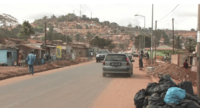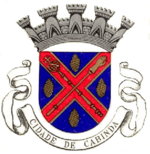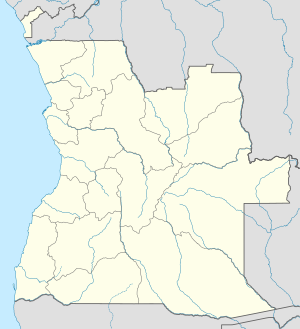Cabinda (city) facts for kids
Quick facts for kids
Cabinda
Chioua
|
||
|---|---|---|
|
Municipality and city
|
||
 |
||
|
||
| Country | ||
| Admin. division | Cabinda province | |
| Founded | 1883 | |
| City Status | 1956 | |
| Area | ||
| • Total | 2,273 km2 (878 sq mi) | |
| Elevation | 24 m (79 ft) | |
| Population
(mid 2020)
|
||
| • Total | 739,182 | |
| • Density | 325.20/km2 (842.27/sq mi) | |
| Climate | Aw | |
Cabinda, also called Chioua, is a city and a municipality in Cabinda Province, Angola. It's a special part of Angola, known as an exclave, which means it's separated from the main country by other nations. Some groups in Cabinda believe it should be an independent country.
In 2014, the city of Cabinda had about 550,000 people. The whole municipality had around 624,646 people. People from Cabinda are sometimes called Cabindas or Fiotes. Cabinda is very important for Angola because it's close to large oil reserves and serves as a major oil port.
Contents
History of Cabinda
The city of Cabinda was started by the Portuguese in 1883. This happened after a special agreement called the Treaty of Simulambuco was signed. This was around the same time as the Berlin Conference, which was a big meeting about dividing up Africa.
Cabinda was once an important port for trade. This included a difficult period when it was used for the slave trade to Brazil.
Today, there are huge oil reserves found in the ocean nearby. This makes Cabinda a very important place for Angola's economy.
Geography of Cabinda
Cabinda is located right on the coast of the Atlantic Ocean. It's in the southern part of Cabinda Province. The city sits on the right side of the Bele River.
The climate in Cabinda is a tropical savanna climate. This means it's generally warm all year with a wet season and a dry season.
Cabinda is about 56 kilometers (35 miles) north of Moanda in the Democratic Republic of the Congo. It's also about 70 kilometers (43 miles) north of where the Congo River meets the ocean. To the south, it's about 137 kilometers (85 miles) from Pointe-Noire in the Republic of the Congo.
Districts of Cabinda City
The city of Cabinda is divided into three main areas, which are called comunas:
- Cabinda: This is the main part of the city. About 88.6% of the city's population lives here.
- Malembo: This district has about 3.1% of the population.
- Tando-Zinze: This district is home to about 8.3% of the population.
Education in Cabinda
Cabinda has several places where students can go for higher education. There are two public universities:
- The 11 de Novembro University
- The Higher Institute of Education Sciences of Cabinda
There are also campuses for private universities, such as:
- The Lusíada University
- The Private University of Angola
Culture of Cabinda
The people of Cabinda have a unique culture. This includes their special ways of dressing and eating. They also have traditional rituals and ceremonies.
One important ritual is called Bakamas do Tchizo. This ceremony helps people connect with the spirits of gods and ancestors. It is believed to bring peace between those who are living and those who have passed away.
Language in Cabinda
When Portugal took control of Cabinda, it was later than other parts of Angola. Because of this, Portuguese, which is the official language of Angola, is not yet spoken by everyone. However, more and more people are learning Portuguese. It is mostly used in official government settings.
The main language spoken by people in Cabinda city and the province is Ibinda. This is a Bantu language.
Transport in Cabinda
There have been plans to connect Cabinda to Angola's main railway system. However, this would mean the railway would need to cross through the Democratic Republic of the Congo.
Notable people from Cabinda
- Eduardo Camavinga (born 2002), a famous French football player.
See also
 In Spanish: Cabinda (ciudad) para niños
In Spanish: Cabinda (ciudad) para niños
 | Charles R. Drew |
 | Benjamin Banneker |
 | Jane C. Wright |
 | Roger Arliner Young |



